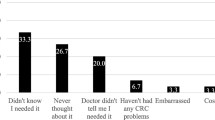Abstract
Comprehensive cancer centers are an important community resource for cancer prevention education in their catchment areas. Colorectal cancer remains one of the most commonly diagnosed cancers in the United States, making prevention a priority. Colorectal cancer prevention targets include lifestyle modifications that are influenced by cultural norms, such as diet change, physical activity and screening behavior. Cancer centers must tailor prevention efforts to multiethnic catchment areas. This paper describes the development and feasibility of a comprehensive cancer center’s approach to community-based colorectal cancer prevention in Houston, Texas, specifically targeting Hispanic and Asian populations. Sites were recruited through a city-wide network of partnerships between the community relations department in the hospital and community organizations. The program consisted of three workshop-style classes per community site. Each class had a similar overall structure, but cultural and site-specific adaptations were made for each group. A total of 33 classes were taught at nine distinct community sites to 1054 participants over 9 months. This program structure may be adapted for the future dissemination of other cancer prevention tools to communities in the area.

Similar content being viewed by others
References
Yang, D. X., Gross, C. P., Soulos, P. R., & Yu, J. B. (2014). Estimating the magnitude of colorectal cancers prevented during the era of screening: 1976 to 2009. Cancer, 120, 2893–2901.
Zahnd, W. E., James, A. S., Jenkins, W. D., Izadi, S. R., Fogleman, A. J., Steward, D. E., Colditz, G. A., Brard, L. (2017). Rural-urban differences in cancer incidence and trends in the United States. Cancer Epidemiology, Biomarkers and Prevention. https://doi.org/10.1158/1055-9965.EPI-17-0430.
Siegel, R. L., Miller, K. D., & Jemal, A. (2017). Cancer Statistics, 2017. CA, 67, 7–30.
Norat, T., Chan, D., Lau, R., Aune, D., & Vieira, R. (2010). The associations between food, nutrition and physical activity and the risk of colorectal cancer: WCRF/AICR Systematic Literature Review Continuous Update Project Report. Imperial College London: WCRF/AICR.
Lisovicz, N., Johnson, R. E., Higginbotham, J., Downey, J. A., Hardy, C. M., Fouad, M. N., Hinton, A. W., & Partridge, E. E. (2006). The Deep South network for cancer control. Cancer, 107, 1971–1979.
Treml, K., Conlon, A. E., Wegner, M. V., Baliker, M., & Remington, P. (2009). Wisconsin’s health department-university partnership model for comprehensive cancer control. Preventing Chronic Disease, 6, A58.
Council, Housing Assistance (2012). Race & ethnicity in rural America. Rural Research Briefs, April, pp. 1283–1288.
Bibbins-Domingo, K., Grossman, D. C., Curry, S. J., Davidson, K. W., Epling, J. W., García, F. A., Gillman, M. W., Harper, D. M., Kemper, A. R., Krist, A. H., & Kurth, A. E. (2016). Screening for colorectal cancer: US Preventive Services Task Force recommendation statement. JAMA 315, 2564–2575.
Scheppers, E., Dongen, E., Dekker, J., Geertzen, J., & Dekker, J. (2006). Potential barriers to the use of health services among ethnic minorities: A review. Family Practice, 23, 325–348.
Raber, M., Chandra, J., Upadhyaya, M., Schick, V., Strong, L. L., Durand, C., & Sharma, S. (2016). An evidence-based conceptual framework of healthy cooking. Preventive Medicine Reports. https://doi.org/10.1016/j.pmedr.2016.05.004
Li, R., Raber, M., & Chandra, J. (2015). Developing a healthy web-based cookbook for pediatric cancer patients and survivors: Rationale and methods. JMIR Research Protocols, 4, e37.
Barg, F. K., & Lowe, J. L. (1996). A Culturally Appropriate Cancer Education Program for African-American adolescents in an Urban Middle School. Journal of School Health, 66, 50–54.
Flores, E., Espinoza, P., Jacobellis, J., Bakemeier, R. & Norma Press (2006). The greater Denver Latino Cancer Prevention/Control Network. Cancer, 107, 2034–2042.
Wolf, H. J., Dwyer, A., Ahnen, D. J., Pray, S. L., Rein, S. M., Morwood, K. D., Lowery, J. T., Masias, A., Collins, N. J., Brown, C. E. & Goheen, C. A. (2015). Colon cancer screening for Colorado’s underserved: A community clinic/academic partnership. American Journal of Preventive Medicine, 48, 264–270.
Acknowledgements
We would like to acknowledge the staff of MD Anderson’s Community Relations and Education department including Francine Huckaby, Terrence Adams, Patricia Priego, as well as the Tai Chi Academy of Houston, all community site contacts and participants, and the Colorectal Cancer Coalition. We are grateful for support from the MD Anderson Cancer Center Support Grant (P30 CA16672) and the Center for Energy Balance in Cancer Prevention and Survivorship, Duncan Family Institute. MR is supported by the National Cancer Institute of the National Institutes of Health, Award Number R25CA057730 (PI: Shine Chang, PhD) and the Archer Foundation. The content is solely the responsibility of the authors and does not necessarily represent the official views of the NIH.
Funding
This study was funded by the MD Anderson Cancer Center Support Grant (P30 CA16672) and the Center for Energy Balance in Cancer Prevention and Survivorship, Duncan Family Institute. MR is supported by the National Cancer Institute of the National Institutes of Health, Award Number R25CA057730 (PI: Shine Chang, PhD) and the Archer Foundation. The content is solely the responsibility of the authors and does not necessarily represent the official views of the NIH.
Author information
Authors and Affiliations
Corresponding author
Ethics declarations
Conflict of interest
The authors declare that they have no conflict of interest.
Ethical Approval
This study was reviewed and approved by the University of Texas MD Anderson Cancer Center Institutional Review Board (#PA18-0098).
Rights and permissions
About this article
Cite this article
Raber, M., Huynh, T.N., Crawford, K. et al. Development and Feasibility of a Community-Based, Culturally Flexible Colorectal Cancer Prevention Program. J Community Health 43, 882–885 (2018). https://doi.org/10.1007/s10900-018-0497-x
Published:
Issue Date:
DOI: https://doi.org/10.1007/s10900-018-0497-x



